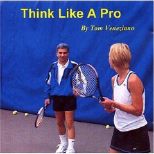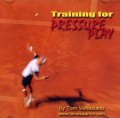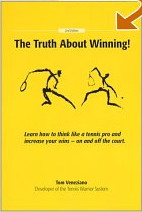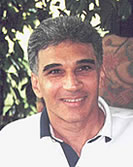Many players believe that once they fail under pressure they need mental tips to straighten out their problem. It may come as a shock you to learn that most of the time the problem of pressure play is physical, not mental.
I have helped many players learn to cope with match play pressure simply by building up their physical skills. Why? Because there are different levels of physical competency in your unconscious, instinctive, spontaneous game.
TWO LEVELS OF COMPETENCY IN THE UNCONSCIOUS
In the first level, a player has practiced relentlessly and has developed his or her physical strokes to an unconscious, instinctive level. This player's game is more than adequate to compete in his or her division. At this level of unconscious competency, a player can adroitly deal with normal play and minor pressure situations.
In the second level, a player has all the skills of the first level but has not brought his or her physical game to a level of unconscious competency necessary to perform under extreme pressure. When the pressure is really on, perhaps in a crucial game to win the set or in a match point, this is the unconscious skill level that breaks down.
All this player needs is more training, practice and repetition to take his existing unconscious skill level to an unconscious, pressure-resistant level.
Instead, most players over-think the situation and mentally labor over their inability to think correctly under pressure. They wander aimlessly from mental tip to mental tip, searching for ways to solve their pressure play dilemma.
I am not telling you that mental tips are not helpful. What I'm telling you is, most of the time your true answer is to improve your physical game to another level.
In a Wall Street Journal article titled "What Happens Under Pressure," Philip Delves Broughton reviewed two books on performance choking: "Clutch" by Paul Sullivan, and "Choke" by Sian Beilock. As Broughton states below, each author came up with the same conclusion about pressure play.
"Both Mr. Sullivan and Ms. Beilock insist on the importance of facing the truth about one's abilities and yet not paralyzing oneself through analysis. In some cases, choking is just a question of not being good enough. Here what is needed is more practice and discipline. But one has to forgo one's pride to admit as much."
Tennis players tend to think the problem is mental because they incorrectly evaluate two situations. First, they can make the shot proficiently under normal play, but when the pressure is on they fail. This leads them to believe the problem is mental. What I just explained about the two levels of unconscious competency handles this first situation. The first level of competency is not adequate to play under extreme pressure.
In the second situation, when a player feels nervous under pressure and then fails, he or she assumes the nervousness made him or her fail. He or she then concludes that his nervousness caused them to fail and therefore they are not a pressure player.
In this scenario the nervousness is simply not the problem. Many players are nervous under pressure but still make their shots. In fact, you often hear top players in the world say they were a little nervous in certain pressure situations.
You can master playing under pressure if you are willing to practice relentlessly to bring your game to that critical second level of unconscious competency. How will you know when you are there? One day you will find yourself under pressure and nervous. Despite the nervousness you will rear back, hit the ball, and before you know it, stand on the sideline as the victor. With a big smile on your face, I might add!










 You will join 13,000 other subscribers in receiving news of updates to the Tennis Server along with monthly tennis tips from tennis pro Tom Veneziano.
You will join 13,000 other subscribers in receiving news of updates to the Tennis Server along with monthly tennis tips from tennis pro Tom Veneziano. 